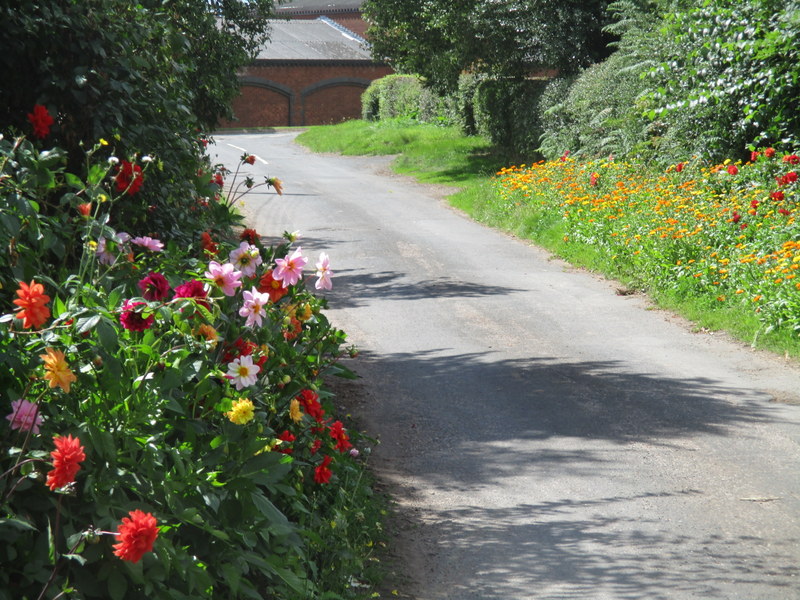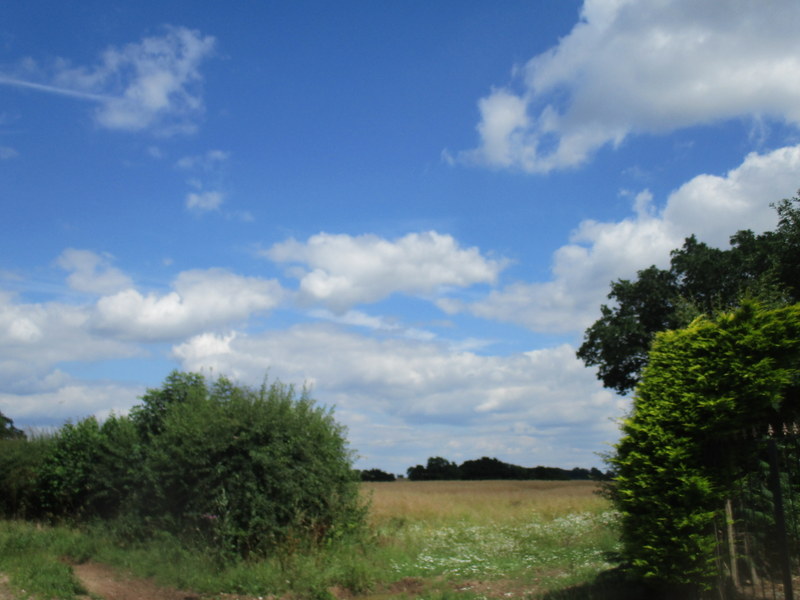'Missing Motivation ------ ?'
Spuds (potatoes), lettuce, onions - salad and cooking - dwarf beans, runner (climbing) beans, soft fruit -raspberries and strawberries - peas, broad beans, radish, landcress (like watercress), courgettes, cucumbers, tomatoes - it's been the 'time of plenty' here on the eco organic micro-holding (small smallholding) in the UK midlands, with potatoes doing particularly well this year due to the absence of any early blight attack -just a little, later on. It's easy just to pop out to the veg. ground to collect a few items, then to make a veggie stir-fry, and at virtually zero cost, appealing to freerange frugal and independence instincts ---- Micro holding activities tend to be well varied this time of year, ' variety being the spice' - certainly helps to maintain interest and motivation, nothing worse than long dragging periods at just one activity - ?
Even in just one relatively short session, quite a number of different small jobs came along : picking raspberries. hand-weeding a row of peas, watering the top glasshouse and the mini bread-tray based raised beds of carrots and spring onions, picking last of the broad beans, mowing the top lawns and roadside borders, digging up some spuds, feeding the chick-chicks and collecting the eggs, walking old Pipster collie a hundred yards or so along the lane (slowly --- ) It all helps to fend off any boredom, particularly when the activities are mostly enjoyable in themselves. July here at the micro-holding was generally a pretty good month - plenty of sun but also some good timely rains, without which there'd be no 'green and pleasant land', and growing stuff would be that bit harder. Following last month's piece's theme, flowers are still in abundance, even down the lane -------
'Wales - land of hope and glory ---- and 'green quality '
Chill out time on a recent visit to the static holiday caravan on a small farm near the coast of west Wales, giving a restful spell ---- It's blissful to not have anything to do for four days, apart from the minimum life supporting activities. What with an abundance of trees and green hills, the Welsh countryside in this district, a river valley area, can only be described as gorgeous, and surprisingly often, fairly unpopulated and untramelled. One stretch of road for instance threw up only two other vehicles in a nine mile stretch, it being a trunk road too. Many of the Welsh roads in this area are new or new-ish, and with generally no heavy traffic, are generally a joy to drive on, complete with scenic backdrop of green hills. Even when sitting having a coffee in a cafe in the middle of, say, a Welsh market town, the view out of the window often reveals the ever-present, comforting green hills just sitting there in the background. Other aspects add to the 'quality' experience - small things like being able to park easily and for free, being able to put free air into a vehicle's tyres, using clean and eminently usable toilets and no mess or litter anywhere .
People here, locals and holidaymakers, seem to be generally relaxed and courteous, all adding too to the 'quality' feel. The Welsh themselves come over as self-contained, sorted, with a strong sense of who they are and their heritage, along with being sociable and gregarious, without being 'in the face'. Good for them - the ultimate 'seats of power' - London and Westminster - must seem a long way away to them, and they are happy to go on with their own sorted, family-orientated sociable ways, helped no doubt too by having their own assembly.
'Trusting that ---- '
In recent pieces in the broadsheet papers, 'trust in the system' amongst the general populace here in the UK has been reported as being at an all time low. Part of the problem could well have been what's been called 'exploitative commercial practice' by large firms such as banks mis-selling personal and small business insurances, and energy firms perceived to be strong-arming their customers into over-paying for energy, using their oligopolistic (few powerful suppliers) position in the market place, 'big beast predators feeding on the small fry'----. Then there's the general distrust of politicians, never particularly well known for keeping to promises, and fuelled here by recent tragic events in which the cheaper cladding used on high-rise flats has been found to then be a fire hazard. Maybe, though, there's an added factor to the 'low trust' syndrome, particularly as it's not found necessarily in all societies - those for instance, of the Scandinavian variety are said to put 'trust' at the heart of their cultures - but mainly, it seems, a feature of the highly commercial and competivised cultures often driven by so-called 'free market' 'anything goes' money-targeted tenets.
In terms of how people are dealt with and managed, it seems that relatively little is heard these days of 'leadership', 'motivation' and 'teamwork', perhaps unsurprisingly considering the degree of modern focus on individual competitivism and self-aggrandisement, leaving less space then for social and community emphases - ? 'Man' it's said 'is not an island', and anyone who's experienced the benefits of being part of a positvely creating team going on to do good things and getting that 2 plus 2 makes 5 experience, will have got 'goodies', which presumably 'modern man' loses out on (so then becoming 'losers' - ?) Modern free-market type cultures may then be of an 'under socialised' variety - ?
Why 'X and Y' - ?
A further influencing factor may be the 'X and Y' scenario, one that's evidently been around for quite awhile, in fact, probably since the early days of mass production - say the 1800's - ? These mass production units would tend to initially be mills wherein people toiled for long hours , low pay and poor working conditions, then attracting the tag of 'those dark, satanic mills --- ' Large employers in those days did not generally get good marks for their humanity to fellow man, and even when working conditions improved, there could be some essential missing elements. Henry Ford's mass production car making factories in the USA, for instance, were apparently geared to providing workers optimal conditions 'to achieve', with the production line bringing everything to the worker, so she/he could then maximise productivity along with job satisfaction, forgeting though that the sheer tedium of endlessly repeating the same basic and simple procedure could drive people 'up the wall', so again employers didn't get maximum 'fellow man' ratings -------
Workers , according to one American motivation theorist, Douglas McGregor, then came to be perceived by employers as having negative traits - being irresponsibe, unwilling, feckless, lazy, work-shy and unresponsive, for instance - which then mean't that they had to be handled and managed by 'control' methods. often referred to as 'carrot and stick' management, which then didn't rate or respect employees particularly highly, nor recognise any 'internal motivation' of people. 'Hang on', though said the researcher, Douglas McGregor, ' people are need-satisfying organisms, therefore, all things being equal, and without any 'conditioned barriers', their natural state should be that of 'motivation'. Employers may not have been over impressed by this argument, but McGregor persisted, 'if people are then exhibiting negative responses to their workplaces, maybe it's because they're getting negative experiences there, such as over-pressure, lack of respect, over control, unstimulating work, poor human treatment, poor supervision and the like?'
This 'high control/ low humanity' low trust style he tagged as a 'theory X style', and he went on to propose an alternative style, which he called 'theory Y', which followed the urgings of a fellow motivation theorist 'Treat people well ----- and use people well' (eg. give them interesting, stimulating work). Whilst the latter style might not suit those aiming/needing to exert 'strong control' and any exploitative people management situations, the theory Y approach has been shown to be effective in the right hands in delivering on-going long-term high productivity levels, and engendering on-going good levels of mutual trust and loyalty, plus having the ability to get to the '5' level, especially in terms of human life experience, and for both employers and employees. One study, for instance, of 'longer-term effective' managers of staff in smaller-scale UK rural business, showed that over 90% of them practised the 'theory Y' approach.
'Micro motivation ----- '
It's certainly a case of 'internal motivation' here on the micro-holding, some days more than others ---- It can get a bit of a drag towards early summer, with a bit of a peak workload 'a-plantin' and 'a-sowin' in spring, and motivation can flag a little, and then it's generally time for that four-day break in Wales, including some time spent by the balming sea. Then back home refreshed to the micro-holding to then start thinking about sorting the fuel - the wood - for the coming winter, looking forward to some good woodstove fires, warming the body --- and the spirit ----



Comments
0 responses so far ↓
There are no comments yet...Kick things off by filling out the form below.
Leave a Comment